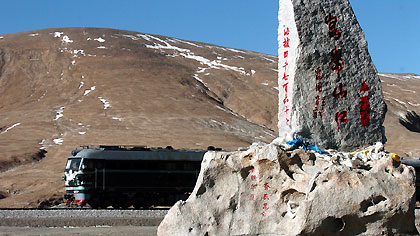"Roof of the world" glaciers melting fast
(Reuters)
Updated: 2006-05-03 09:00
BEIJING, May 2 - Glaciers covering China's Qinghai-Tibet plateau are
shrinking by 7 percent a year due to global warming and the environmental
consequences may be dire, Xinhua news agency reported on Tuesday.
|
 |
|
A
train runs across the pass of Tanglha Mountain on the
Qinghai-Tibet Plateau on April 2, 2006.
[Xinhua] |
Rising temperatures that have
accelerated the melting of glaciers across the "roof of the world" will
eventually turn tundra that spans Tibet and surrounding high country into
desert, the agency quoted Professor Dong Guangrong with the Chinese Academy of
Sciences as saying.
Dong warned the deterioration of the plateau may trigger more droughts and
increase sandstorms that lash western and northern China. He reached his
conclusions after analysing four decades of data from China's 681 weather
stations.
Han Yongxiang of China's National Meteorological Bureau said average
temperatures in Tibet had risen 0.9 centigrade since the 1980s, accelerating the
melting of glaciers and frozen tundra across the plateau.
The Qinghai-Tibet plateau covers 2.5 million square km (0.96 million square
miles) -- about a quarter of China's land surface -- at an average altitude of
4,000 metres (13,000 ft) above sea level.
Dust and sandstorms are a growing problem, particularly in North China, due
to deforestation, drought and the environmental depredations of China's
breakneck economic growth.
A strong sandstorm swept across one eighth of China's territory on April 16
and 17, dumping 330,000 tonnes of dust on Beijing and reaching as far as Korea
and Japan.
China's weathermen might soon launch a "dust forecast" in their bulletins,
Xinhua quoted a China Meteorological Administration official as saying.
|